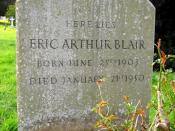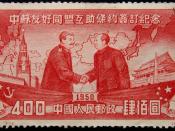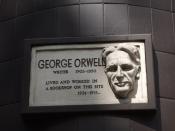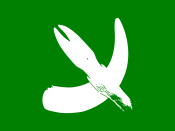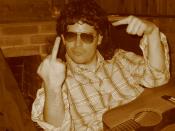In George Orwell's Animal farm, the animals represent people in the Soviet Union's Communism. As the story goes, the animals are encouraged by a great and respected boar, Old Major, to revolt against the humans that they work for. After the revolution suddenly occurs, the animals are happy and believe they are working for themselves. However, the competitive and scheming pigs Napoleon and Snowball, representing Stalin and Trotsky, slowly take advantage of the situation, turning the totalitarian society into a communist regime. Life for the animals is not too bad when Napoleon and Snowball are in direct competition, but Napoleon soon ousts Snowball and seizes control with his personally-trained dogs. He then "convinces"ÃÂ the animals to work harder and for less food while he and his fellow pigs become more and more human in behavior and appearance until at the end the animals don't know which was worse anymore: having a cruel animal dictator or their old drunken excuse for a farmer.
The message of the story was to warn the world about the dangers of communism which may seem like an ideal form of government, but the people that get in power want to stay in power using whatever means they can. At first, the animals were doing fine working hard for themselves. Then the pigs took advantage of the other animals' lower intelligence by convincing them that they needed the milk and apples for themselves. From there, it went downhill for the other animals. When Napoleon started making radical changes to the rules, objections were made but were quickly hushed by his dogs. This kept happening until the animals decided it was best not to go against him and just work, which was exactly what he wanted.
Orwell chose to use animals as the characters to show his ideas from a new angle, and to show his disgust for communism. His language and word choice was grim and pessimistic. The animals use the word "comrade"ÃÂ (starts on page 27 when Old Major gives his last speech) when they are speaking to each other, especially when the pigs were talking to the working animals, which gave the impression that they were on the same standing. The character Napoleon is the quiet, scheming dictator that represented Stalin. Squealer, the stout pig was used as a messenger between Napoleon and the other animals and often convinced them to change their mind about a situation, so he represented the media. Boxer, an old but strong work horse, was the ideal communist worker: loyal, hardworking and uneducated. Benjamin the donkey was educated but didn't say much, and represented the educated people in a communist society; if they knew what was good for them, they would keep their mouth shut. There was a socialist quote mentioned in the introduction of the book: "Don't think. If you think, don't write. If you think and write, don't publish. If you think and write and publish, don't be surprised what happens to you."ÃÂ (xi) These characters are the main characters of the book, and sum up the main types of people in a communist society.
Animal farm was a good example on how communism, a seemingly ideal form of government in which all are equal, can be easily turned into a dystopia for whoever's not part of the ruling party, where some are more equal than others. George Orwell used a pessimistic choice of words to set a dark and helpless mood for the story. Adding depth and making the animals represent things helped get his message across more vividly.
